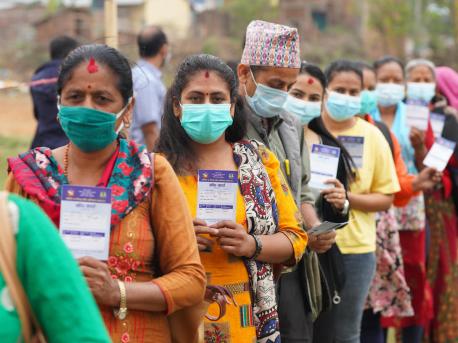
ICU Beds Overflow as COVID-19 Surges in Nepal
Doctors and nurses are struggling to treat patients gasping for breath in Nepal, where confirmed cases of COVID-19 have increased sharply in the past two weeks. UNICEF is on the ground, working with partners to support strained health systems and deliver critical lifesaving supplies.
The catastrophic second wave of COVID-19 cases that hit India first has spread to nearby nations especially Nepal, Sri Lanka and the Maldives. Very low levels of vaccination in most South Asian countries (less than 10 percent in India, Sri Lanka and Nepal) is adding to concern that the virus will spiral even further.
India's ferocious second wave is spreading rapidly to neighboring South Asian countries
"Two weeks ago, we didn't even have 10 patients in the COVID-19 ward," said Dr. Subash Prasad, intensive care specialist at Tribhuvan University Hospital in Kathmandu, the nation's capital. "We have admitted around 75 people who have tested positive for coronavirus since then. And two weeks ago, we didn't have any patients in the ICU. Now the 12-bed COVID ICU is full."
Doctors report "terrifying" conditions in Kathmandu, the nation's capital
The lockdown in Kathmandu and surrounding districts has been extended until May 27, 2021 as case rates and death tolls continue to climb. On May 9, Nepal reported 88 deaths from COVID-19, a 52 percent increase from the day before, surpassing India's per capita death rate. By May 11, the daily death toll had risen to 225.
The crisis of Nepal's coronavirus surge is compounded by the country's severe lack of qualified health care workers; there are reports of nurses caring for 20 critically ill patients at once.
UNICEF is working with partners to strengthen strained health systems and deliver COVID-19 vaccine doses and critical lifesaving supplies
UNICEF has been working with partners along Nepal's 1,089-mile border with India, strengthening screening processes, helping to isolate those who test positive and providing travelers with vital health safety information on how to prevent the spread of COVID-19.
As part of the Global COVAX Facility, UNICEF is coordinating procurement and supply of COVID-19 vaccines around the world — including 1.2 billion doses to low- and middle-income countries. Nepal received its first COVAX shipment of 48,000 COVID-19 AstraZeneca vaccine doses on March 7; that total has since risen to 348,000 doses, prioritized for health care workers and frontline workers.
“Viruses know no borders," said George Laryea-Adjei, UNICEF Regional Director for South Asia. "We must come together now as a global community to stop the devastation and protect our children.”
You can help UNICEF rush critical lifesaving supplies, services and vaccines to protect health workers and families in Nepal and surrounding countries. Please donate today.
Top photo: Health workers lined up to receive their second dose of COVID-19 vaccine at the Palungtar Community Health Center in Gorkha District in north-central Nepal on April 21, 2021. Less than 10 percent of Nepal's population has been vaccinated. In the past few weeks, there has been a devastating rise in confirmed COVID-19 cases and deaths. © UNICEF/UN0447246/Prasad Ngakhusi. Videos: Tong Su


